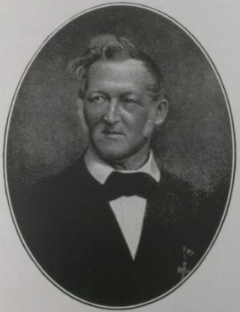At the time Dubois conceived his plan to search for a missing link, the human fossil record consisted of very little: five incomplete Neandertal skeletons, one partial jawbone of uncertain provenance, and a half-dozen ice-age humans recently found by railway workers in a cave at a cliff called Cro-Magnon near Les Eyzies, France. Of the Neandertal specimens, the best preserved was sitting unremarked on a shelf in London. It had been found by workers blasting rock from a quarry in Gibraltar in 1848, so its preservation was a wonder, but unfortunately no one yet appreciated what it was. After being briefly described at a meeting of the Gibraltar Scientific Society, it had been sent to the Hunterian Museum in London, where it remained undisturbed but for an occasional light dusting for over half a century. The first formal description of it wasn't written until 1907, and then by a geologist named William Sollas "with only a passing competency in anatomy."
在杜布瓦想出他關于尋找聯結猿和人類的缺環的計劃的時候,已經發現的人類化石少得可憐:5塊不完整的尼安德特人骸骨,一小塊來源不明的頜骨,以及6塊冰川期的人類骸骨,后者是鐵路工人剛剛在法國萊埃濟附近的克羅馬農懸崖的一個洞穴里發現的。尼安德特人骸骨中最完整的一塊后來被放在倫敦的一個架子上,沒有引起人們的注意。它能被保存下來可以說是一個奇跡,因為它是1848年工人們在直布羅陀附近的一個采石場爆破巖石時發現的:不幸的是當時還沒有人識貨。有人在直布羅陀科學學會的一次會議上對它怍了輕描淡寫的介紹,之后它就被送往倫敦亨特博物館,除了偶爾有人輕輕擦去上面的灰塵以外,有半個多世紀無人碰過:直到1907年,才有人對它作了第一次正式描述。這人名叫威廉`索拉斯,是—位地質學家,“在解剖學方面只是勉強合格”。

約多·卡爾·弗爾洛特
So instead the name and credit for the discovery of the first early humans went to the Neander Valley in Germany—not unfittingly, as it happens, for by uncanny coincidence Neander in Greek means "new man." There in 1856 workmen at another quarry, in a cliff face overlooking the Dussel River, found some curious-looking bones, which they passed to a local schoolteacher, knowing he had an interest in all things natural. To his great credit the teacher, Johann Karl Fuhlrott, saw that he had some new type of human, though quite what it was, and how special, would be matters of dispute for some time.
因此,德國的尼安德特山谷倒成了第一批早期人類化石的發現地和命名地——不過這倒歪打正著,因為尼安德特這個詞在古希臘語里面恰好是“新人”的意思。1856年,在那里,工人們又在杜塞爾河沿岸峭壁的另一個采石場發現了一些怪模怪樣的骨頭。他們把這些骨頭交給當地學校的一名教師,因為他們知道他對自然界所有的事物都感興趣。很值得稱道的是,這位名為約多·卡爾·弗爾洛特的教師意識到他可能已發現了某種新的人類,不過這種人類是什么,他們有什么特點,這些問題人民還需要爭論一段時期。












